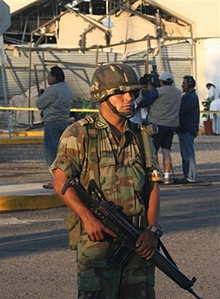 |
 |
 |
 Editorials | Issues | August 2007 Editorials | Issues | August 2007  
Mexico's State of Discontent
 Dolly Mascarenas - Time.com Dolly Mascarenas - Time.com
go to original


| | A soldier stands near the site of a bomb explosion in Oaxaca City, Mexico, Wednesday Aug. 1, 2007. A small, homemade bomb exploded outside a store in the troubled southern city of Oaxaca early Wednesday, damaging the entrance but causing no injuries, authorities reported. A similar bomb was found and deactivated outside the entrance of a nearby bank. (AP/Luis Alberto Cruz) |
Whatever it was that went "poof" at an entrance to the Sears outlet in the Plaza del Valle Mall in Oaxaca City was certainly not big enough to be called a "bomb." It did damage to the door and a couple of glass panes but an "explosive artifact" was the most threatening term local law enforcement were willing use to describe it. Sears and the 116 other stores in the mall quickly reopened. And yet, the Mexican Army was out in force outside the department store all day, looking stern and watchful yet all the while saying that there was nothing to be worried about. By evening, teenagers and families were again at the mall, many lining up for tickets at the mall's 10 theater multiplex. But there is indeed much to worry about in the state of Oaxaca.

Oaxaca was once a haven for tourists because of its colorful native American culture and Spanish colonial architecture. But there is widespread anxiety, not just because of the Sears bomb or another "artifact," undetonated, was found outside a branch of a bank in a middle-class district of the city. Oaxaca is simmering in civil discord: the state has been torn by political strife and unrest since last year — all of which is now attenuated by contentious local elections pitting the conservative government against left-wing political groups scheduled for Sunday.

The turmoil has spilled from Oaxaca into neighboring Mexican states. In early July, explosions shook installations of Petroleos Mexicanos (Pemex), the national oil company, in the state of Guanajuato, just north of this region. At first the government said the cause was poor maintenance but later admitted it was a terrorist act when the Ejercito Popular Revolucionario (EPR) — The Popular Revolutionary Army — took responsibility for the incidents and demanded the release of two comrades taken into custody by the army in Oaxaca. The EPR espouses radical Marxist redistribution of wealth and the rights of indigenous peoples; it bases itself in the mountains and hills of Oaxaca and Guerrero states. On Wednesday evening, the EPR took responsibility for the less-than-impressive "artifacts." There might be more trouble. A well-connected Mexico City columnist, Raymundo Riva Palacio of the daily El Universo Grafico, told TIME that he believes the EPR is also holding two businessmen for ransom, asking $68 million for their release.

After today's bomb, the department of public safety sent a general alert to all police departments. Security was reinforced at all levels, especially around the Zocalo or main plaza, the international airport and the Pemex installations just outside Oaxaca city. Nevertheless, despite the increase in police and army forces, a demonstration by 200 women in support of the left-wing political opposition group APPO (Asamblea Popular de los Pueblos de Oaxaca or Popular People's Assembly of Oaxaca) took place as scheduled. As the elections approached, there have been daily marches, loud public denunciations of the state and federal government, revolutionary banners in support of APPO and the EPR as well as graffiti on the centuries old walls of this once beautiful, colorful and peaceful city.

The situation will be complicated by the vote count for the local assembly in Sunday's election. Oaxaca is divided into more than 500 municipalities and only 152 have what is called universal suffrage. The rest vote by what is known as usos y costumbres, that is custom and tradition, which usually means a council of elders or a leading member of the village decides how to commit the community's votes. APPO has accused the government of plotting to intimidate the usos y costumbres vote into abstaining, thereby tipping the assembly into more conservative hands.

Civil society has not broken down to the extent that it did last year when rightist and leftist forces battled it out for control of the Zocalo and the University. But many fear that Oaxaca is once again inching toward some kind of breakdown. On Wednesday evening, Oaxaca's governor Ulises Ruiz urged calm, telling TIME that today's abortive bombs were simply aimed at disrupting the elections. "Oaxaca is not violent," he said, "not even with last year's events. That is not Oaxaca." He added, "The people responsible will be punished by the full weight of the law." | 
 | |
 |



